|
|
|
Sort Order |
|
|
|
Items / Page
|
|
|
|
|
|
|
| Srl | Item |
| 1 |
ID:
151495
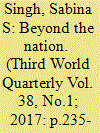

|
|
|
|
|
| Summary/Abstract |
Global frameworks for democratic development today tend to remain within a comparative lens where each country is treated as a sovereign capsule. This portrait eludes the political structures that accompany contemporary globalisation and set the conditions for domestic development. Notably, the comparative perspective eschews the hierarchical nature of states and influential non-state actors that impact democracy movements. Merging international relations theory and comparative politics and using the example of Uganda to illustrate, I create ‘the politics of dispensation.’ Like a doctor dispensing a pill to a patient, Uganda shows how susceptible a country can be to forces beyond democratic control.
|
|
|
|
|
|
|
|
|
|
|
|
|
|
|
|
| 2 |
ID:
160050
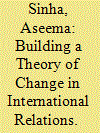

|
|
|
|
|
| Summary/Abstract |
Fundamental transformations in the distribution of power among nations have re-focused the attention of the International Relations (IR) subfield on how to understand change and power transitions. I add to this larger literature by presenting a typology of change drawn from comparative politics that incorporates attention to incremental or slow moving change, and path-dependence as a theoretical tool to explain discontinuous change such as wars, and the fall of the former Soviet Union. I offer a distinction between process of change and its outcome. Change may be incremental or disruptive and could lead to continuity with existing institutions or their transformation. This typology allows us to explore the process of change and develop theories of change in a new way. In essence, I argue for broadening our conceptions of change to account for endogenous sources of change (internal to the system), and incremental yet significant change.
|
|
|
|
|
|
|
|
|
|
|
|
|
|
|
|
| 3 |
ID:
181818
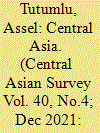

|
|
|
|
|
| Summary/Abstract |
This article answers the question of why Central Asia studies has not contributed more fully to the study of comparative politics since the collapse of the Soviet Union. It argues that during the Soviet period, Central Asia remained a dark matter to Western scholars specializing in Sovietology and who lacked access to the region. Although in the 1990s Western academics saw the ‘light at the end of the tunnel’, expecting Central Asia to join the liberal world order, these hopes declined after the 2000s when not only the transition paradigm failed, but also because a consolidated form of authoritarianism closed access to the field. In conclusion, this article offers the most promising fields for the development of the study of comparative politics across and inside Central Asia.
|
|
|
|
|
|
|
|
|
|
|
|
|
|
|
|
| 4 |
ID:
151493


|
|
|
|
|
| Summary/Abstract |
Our aim is to problematise the dominant discourses and practices around civil society from a Southern perspective. We first examine critically, from a broadly Gramscian perspective, the way in which the concept of civil society has been deployed in development discourse. This highlights its highly normative and North-centric epistemology and perspectives. We also find it to be highly restrictive in a post-colonial Southern context insofar as it reads out much of the grassroots social interaction, deemed ‘uncivil’ and thus not part of duly recognised civil society. This is followed by a brief overview of some recent debates around civil society in Africa which emphasise the complexity of civil society and turn our attention to some of the broader issues surrounding state-society relations, democracy and representation in a Third World context, exemplified through our case study research in Mozambique, Inhassunge district (Zambézia Province). The privileging of Western-type Non-governmental organizations (NGOs) as drivers of democracy and participatory development in Mozambique have considerable implications for current debates around good governance, civil society strengthening and social accountability programmes and strategies.
|
|
|
|
|
|
|
|
|
|
|
|
|
|
|
|
| 5 |
ID:
131693
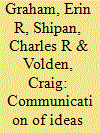

|
|
|
| 6 |
ID:
075278
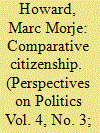

|
|
|
|
|
| Publication |
2006.
|
| Summary/Abstract |
In this article, I attempt to integrate the study of citizenship into debates in comparative politics, in two different ways. First, I justify the real-world importance of the topic, and thereby encourage other scholars to grapple with its manifestations and implications. Second, I present some suggestive evidence, based on the 15 "older" countries of the European Union (EU). The findings not only illustrate the extent of cross-national variation in citizenship policies at two different time periods, but they help to demonstrate the applicability of comparative analysis to categorizing and explaining both long-lasting cross-national differences and more recent change in some countries. In explaining the historical variation within the EU, I consider whether or not a country had a prior experience as a colonial power, as well as whether it became a democracy in the nineteenth century. In accounting for continuity or change over the last few decades, I argue that while various international and domestic pressures have led to liberalization in a number of countries, these usually occurred in the absence of public discussion and involvement. In contrast, when public opinion gets mobilized and engaged on issues related to citizenship reform-usually by a well-organized far right party, but also sometimes by a referendum or petition campaign-liberalization is usually blocked, or further restrictions are introduced. This finding raises important, paradoxical, and troubling questions about the connection between democratic processes and liberal outcomes.
|
|
|
|
|
|
|
|
|
|
|
|
|
|
|
|
| 7 |
ID:
096294
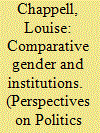

|
|
|
|
|
| Publication |
2010.
|
| Summary/Abstract |
A comparative politics of gender offers an opportunity to consider in detail the operation of gender within political institutions. As such, it contributes to a deeper understanding of the roles and experiences of men and women within political institutions, of the policies, laws and norms that are the outcomes of these institutions, and of the relationship between these institutions and social actors. This essay proposes a multi-directional strategy for undertaking comparative gender and institutional research that includes taking account of similarities and differences within and across states, between states and international institutions, across space as well as across time. It argues that through this research strategy it is possible to gain a more nuanced understanding of gender processes and outcomes, which is valuable to those working both inside and outside political institutions to advance a women's equality agenda.
|
|
|
|
|
|
|
|
|
|
|
|
|
|
|
|
| 8 |
ID:
037821
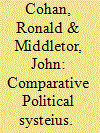

|
|
|
|
|
| Publication |
New York, American Museum Sourcebook, 1967.
|
| Description |
xiv, 512p.
|
|
|
|
|
|
|
|
|
|
|
|
Copies: C:1/I:0,R:0,Q:0
Circulation
| Accession# | Call# | Current Location | Status | Policy | Location |
| 015735 | 320.309/COH 015735 | Main | On Shelf | General | |
|
|
|
|
| 9 |
ID:
046752
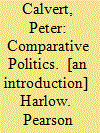

|
|
|
|
|
| Publication |
Harlow, Pearson Education Limited, 2002.
|
| Description |
xiv, 351p.
|
| Standard Number |
0582438233
|
|
|
|
|
|
|
|
|
|
|
|
Copies: C:1/I:0,R:0,Q:0
Circulation
| Accession# | Call# | Current Location | Status | Policy | Location |
| 045633 | 320.3/CAL 045633 | Main | On Shelf | General | |
|
|
|
|
| 10 |
ID:
096299
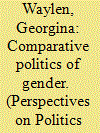

|
|
|
|
|
| Publication |
2010.
|
| Summary/Abstract |
I explore some of the limits and possibilities for a comparative politics of gender (CPG). It argues that a CPG should analyze how major political processes and institutions are gendered thereby increasing our understanding of the major themes of comparative politics and enhancing the subfield. But a CPG should also go beyond this. It should be problem driven and should seek to answer some "big questions" that are important for any efforts to achieve gender equality such as how political change that lessens gender inequality occurs; and how positive gender outcomes come about in a range of contexts. A CPG therefore has an integral connection to a feminist project. I explore some of these themes using the recent literature on gender and transitions to democracy to answer the question under what circumstances can the gender outcomes of transitions be positive.
|
|
|
|
|
|
|
|
|
|
|
|
|
|
|
|
| 11 |
ID:
096289
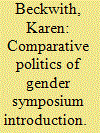

|
|
|
|
|
| Publication |
2010.
|
| Summary/Abstract |
This symposium is the culmination of work that began in October 2007, when fourteen scholars from Australia, the United Kingdom, and the United States convened at Case Western Reserve University to participate in the research conference Toward a Comparative Politics of Gender: Advancing the Discipline along Interdisciplinary Boundaries. The conference was funded by a Presidential Initiative Grant from the University and further supported by an ACES grant. Dr. Gregory Eastwood made available the Library of the Inamori Center for Ethnics and Excellence for our conference meetings. Many thanks to Linda Gilmore, Tonae Bolton-Dove, Gail Papay, Shelley White, and Sharon Skowronski for their expert administrative support. Professors Dorothy Miller (Women's Studies), Rosalind Simson (Philosophy, Law and Women's Studies), and Kelly McMann (Political Science and International Studies) served as discussants of the conference papers. To Theda Skocpol, who presented remarks at the opening dinner of the conference, and to the scholars who participated in the CPG conference and whose contributions are included in this symposium, I offer my deepest appreciation and gratitude.
What do we mean by a comparative politics of gender? How would a comparative politics of gender advance our understanding of politics generally? What would it take to develop a gendered comparative political analysis? In the essays that follow, Teri Caraway, Louise Chappell, Leslie Schwindt-Bayer, and Aili Mari Tripp elaborate their understandings of a comparative politics of gender. Five additional essays focus specifically on issues of democratization (Lisa Baldez, Georgina Waylen), political institutions and representation (Mili Caul Kittilson, Mona Lena Krook), and comparative sex equality policies (Mala Htun and Laurel Weldon). In this introductory essay, I discuss what I mean by "gender" in the context of comparative politics. Briefly enumerating the advantages of comparative politics as a subfield for a gendered analysis of political phenomena, I discuss how a comparative politics of gender can serve to advance our understanding of politics generally, and I provide an example of subfield research-the study of political violence-where gender as a metaconcept may be particularly useful. I conclude by considering what it would mean to our study of gender and of comparative politics to place gender as a central concept in comparative political research and to move to a comparative politics of gender.
|
|
|
|
|
|
|
|
|
|
|
|
|
|
|
|
| 12 |
ID:
096298
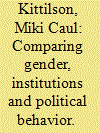

|
|
|
|
|
| Publication |
2010.
|
| Summary/Abstract |
Integrating the behavioral and institutional approaches to comparative politics will provide a more comprehensive theoretical framework for understanding why differences in political engagement among men and women vary cross-nationally and cross-temporally. This essay advances the argument that gender-related policies and institutions are not only outcomes in the political process, but also exert powerful influence over citizens' interests, values, and perceptions of politics. This policy feedback loop has implications for a wide array of political attitudes and activities-from political interest to running for elected office. Specifically, the adoption and expansion of national policies on issues such as equal wages, childcare provision, paid maternity leave, and violence against women carry important messages to the electorate: Issues that disproportionately affect women, long considered private, have become important national policy choices.
|
|
|
|
|
|
|
|
|
|
|
|
|
|
|
|
| 13 |
ID:
096292
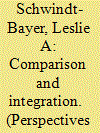

|
|
|
|
|
| Publication |
2010.
|
| Summary/Abstract |
Moving from a "gender and comparative politics" to a "comparative politics of gender" is a challenging proposition. In this essay, I offer two mechanisms for doing this-emphasizing the comparative nature of gender politics research and encouraging greater integration of gender research into the subfield of comparative politics. I illustrate how current research generally uses a "gender and comparative politics" approach that is insufficient for advancing the field and then describe how scholars can work to emphasize greater comparison and integration in the literature. This will help to move the gender and politics literature toward a comparative politics of gender.
|
|
|
|
|
|
|
|
|
|
|
|
|
|
|
|
| 14 |
ID:
037783
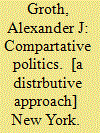

|
|
|
|
|
| Publication |
New York, Macmilhan Company, 1971.
|
| Description |
xi, 289p.
|
|
|
|
|
|
|
|
|
|
|
|
Copies: C:1/I:0,R:0,Q:0
Circulation
| Accession# | Call# | Current Location | Status | Policy | Location |
| 007365 | 320.3/GRO 007365 | Main | On Shelf | General | |
|
|
|
|
| 15 |
ID:
133784
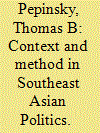

|
|
|
|
|
| Publication |
2014.
|
| Summary/Abstract |
This essay introduces and evaluates a central debate about context sensitivity in Southeast Asian political studies. Within this diverse field, there is no agreement about what context means, or how to be sensitive to it. I develop the idea of unit context (traditionally, the area studies concern) and population context (traditionally, the comparative politics concern) as parallel organizing principles in Southeast Asian political studies. The unit context/population context distinction does not track the now-familiar debates of qualitative versus quantitative analysis, nor debates about positivist epistemology and its interpretivist alternatives, nor even political science versus area studies. Context is not method, nor epistemology, nor discipline. Rather, the core distinction between unit-focused and population-focused research lies in assumptions about the possibility of comparison, or what methodologists call unit homogeneity. While I conclude on an optimistic note that a diverse Southeast Asian political studies (embracing many disciplines and many methodologies) is possible, the fact remains that unit context and population context are fundamentally incommensurate as frameworks for approaching Southeast Asian politics, and that population context is the superior approach.
|
|
|
|
|
|
|
|
|
|
|
|
|
|
|
|
| 16 |
ID:
096597


|
|
|
|
|
| Publication |
2010.
|
| Summary/Abstract |
Comparative politics has witnessed periodic debates between proponents of contextually sensitive area studies research and others who view such work as unscientific, noncumulative, or of limited relevance for advancing broader social science knowledge. In Southeast Asia in Political Science: Theory, Region, and Qualitative Analysis, edited by Erik Martinez Kuhonta, Dan Slater, and Tuong Vu, a group of bright, young Southeast Asianists argue that contextually sensitive research in Southeast Asia using qualitative research methods has made fundamental and lasting contributions to comparative politics. They challenge other Southeast Asianists to assert proudly the contributions that their work has made and urge the rest of the comparative politics discipline to take these contributions seriously. This symposium includes four short critical reviews of Southeast Asia in Political Science by political scientists representing diverse scholarly traditions. The reviews address both the methodological and the theoretical orientations of the book and are followed by a response from the editors.
|
|
|
|
|
|
|
|
|
|
|
|
|
|
|
|
| 17 |
ID:
123400
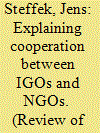

|
|
|
|
|
| Publication |
2013.
|
| Summary/Abstract |
The ever closer collaboration between intergovernmental organisations (IGOs) and non-governmental organisations (NGOs) is empirically well described but poorly theorised. In this article I develop a general theoretical framework for analysing emergent patterns of cooperation between IGOs and NGOs, which may be used to generate hypotheses or guide comparatives studies. The starting point is a conception of organisational actors as purposeful but resource-dependent. The article then combines a 'resource exchange perspective' from organisational sociology with the model of a policy cycle from comparative politics. The result is a theoretical framework that allows to identify incentives for, as well as obstacles to, IGO-NGO cooperation along all phases of the policy cycle. In a concluding section the limits of this model and the underlying assumptions are discussed.
|
|
|
|
|
|
|
|
|
|
|
|
|
|
|
|
| 18 |
ID:
152447
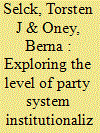

|
|
|
|
|
| Summary/Abstract |
This article offers an analysis of the level of post-1980 Turkish party system institutionalization (PSI) and party system type. Although Turkey shares characteristics with both established and new democracies, no research has compared Turkey to both the established and new democracies with regard to PSI. Utilizing Croissant and Völkel’s four-dimensional index of PSI and Siaroff’s typology of party system type, this article shows that the level of Turkish PSI is higher than that of new democracies. The Turkish party system has not been fully institutionalized yet; however, the dominant party system introduces a certain degree of stability and predictability.
|
|
|
|
|
|
|
|
|
|
|
|
|
|
|
|
| 19 |
ID:
096296
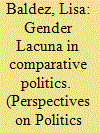

|
|
|
|
|
| Publication |
2010.
|
| Summary/Abstract |
What accounts for the glaring inattention to work on gender within mainstream political science? Part of the problem lies in the substance of scholarship itself. The concepts, central questions, and key variables that predominate in the mainstream literature on comparative democratization and in the literature on gender and democratization have contributed to the gulf between them. But a more fundamental explanation lies in the starting assumptions of scholars in the two camps. Mainstream scholars rarely question whether gender is relevant to politics, and gender scholars rarely question whether gender isn't relevant to politics. I illustrate some ways in which gender could be incorporated into mainstream work, and discuss how gender research could be made more broadly comparative.
|
|
|
|
|
|
|
|
|
|
|
|
|
|
|
|
| 20 |
ID:
096290
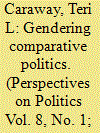

|
|
|
|
|
| Publication |
2010.
|
| Summary/Abstract |
This essay offers a conceptualization of a comparative politics of gender (CPG) and some explanations for why CPG work is marginalized in the comparative politics subfield. I delineate CPG as a field of study in which gendered dependent or independent variables are the defining feature and present illustrative examples of four different types of CPG research. I contend that institutional and historical factors account for much of the marginalization of CPG research, and I propose some courses of actions through which CPG scholars can lessen this marginalization. The failure of comparative politics scholars to engage with gendered work is also a serious problem. The essay concludes by offering some suggestions for better integrating CPG scholarship into the subfield.
|
|
|
|
|
|
|
|
|
|
|
|
|
|
|
|
|
|
|
|
|